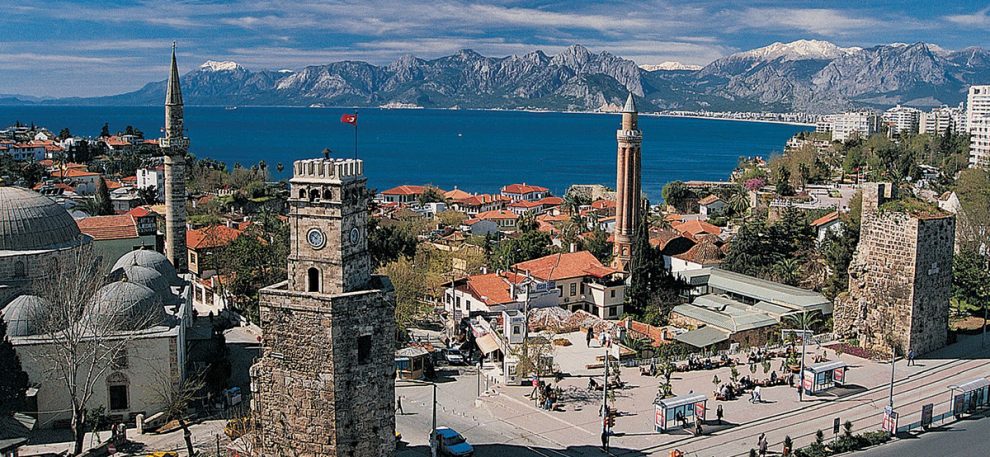by Roberta Vaduva
The Turkish way towards modernity and Ankara’s new ambitions. Roberta Văduva and Lorenzo Somigli discuss Turkey, an old-new power.
We dedicate this dialogue to a fine connoisseur of Turkey, the journalist Giuseppe Mancini, who died prematurely. Mancini gave us some analyses of high depth and competence, that are an example to anyone who wants to deal with foreign affairs or does not want to limit himself to the few brief and laconic bulletins. Cotidie morimur and, therefore, we must accept, it is certain that he has left us a lot: the stimulus, the spark, the curiosity for a varied country. Let’s snatch the title from the Poet – we don’t want to – adapting it to the contingencies: curiously, a century later, the Great Proletarian (“La Grande Proletaria” by Italian writer Giovanni Pascoli; by this name the poet meant Italy) is cut off from Libya, a shining example of tribalization, wherein 1911 it landed pompously feasting on the remains of the Ottomans, whose descendants have returned and now permanently occupy the territory.

Lorenzo Somigli: “A success (or a failure) is never causal. Turkey‘s renewed global weight, its dynamism, and constant presence in strategic scenarios, in Libya and the Horn of Africa, are the result of long-term choices and the sedimentation of slow processes. First, the legacy of Kemalism is tangible and is renewed daily. One can live in Anatolia, in the Caucasus, overlooking the mare nostrum (Ak Deniz) or the Black Sea but the crescent moon and the star on a background of bright red unite everyone. From scattered identities, a nation was born. And it was not and is not taken for granted. The Turkish Republic was born on 29 October 1923, almost a hundred years ago, in Italy, a period of a completely different nature had just begun.
In the years following the Second World War, Turkey is a strategic partner of NATO, if we consider its position as a natural bridge, and it represents a solid barrier against the appetites of Moscow: the base of Incirlik and its numerous atomic bombs (official data report about 80) speak clearly. In recent decades, moreover, Turkey has been investing in infrastructure, building, linking its varied territories, and connecting with the world, and I say this mindful of the many battles for infrastructure, such as the airport in Florence: infrastructure is our gateway to the world.
The late Giuseppe Mancini gave us an insightful reflection on Kanal İstanbul: The culture of the Bosphorus. A conversation with Giuseppe Mancini – Il Tazebao
Antalya, in short, well represents the new Turkey of Erdoğan. One immediately notices the strong urban planning, the scientific government of urban development, the design, the uniformity that translates into serial houses, mosques in line with the landscape, which seem almost Byzantine churches, bare, contained (but rich inside).
Religion breaks in modestly, only at prayer times with the chanting of the muezzin that marks another social rhythm, parallel and not hostile.
To look at it, it looks like the layout of a European, German city, and I am right to remind you that even Ankara received contributions from German architects, such as Jansen, already known for his “Groẞ-Berlin” plan, which, not by chance, contemplated the protection of urban greenery.
In addition, large buildings, all equipped with solar panels to heat water – and we are talking of green transition in Europe – very recent (from the 80s onwards), gardens where people meet, the lively bazaar that mixes everything. Their urbanism fascinates me. The tram lines that connect everything, the cemeteries not separated from the urban life but embraced by avenues and neighborhoods, these brand-new gated communities equipped with everything”.

Roberta Văduva: “It is pyramidal and systemic society, although organic would be the right term. Let me explain: everyone knows, accepts, is proud, and is jealous of their place in the pyramid. Everyone is aware of their importance and usefulness in the community. And this is not due at all to the temperance that Plato identified as the glue of the society he conceived but is attributable to religion. A modest religion, which everyone lives as he or she sees fit (let’s not remain forever attached to the conversion of Aghia Sophia into a mosque).
Everything is very orderly and harmonious: the gears of daily life, a slow, calm life marked by long pauses for conviviality and sociability mark the inevitable passage of time. The muezzin reminds us of this every day, five times a day!
When you hear his lament (let’s call it a lament because it conveys well the idea of pathos, of divine transcendence), you already know what time it is without the need to look at your watch: it’s time to stop for a moment and make sense of what you’re doing and organize your day.

Community is a social organization that is still very strong and felt, both by the elderly and the young. Urbanism artificially grafts itself onto the construct of community while simultaneously helping to preserve this social entity. I am reminded of the young boy who came to the mosque to pray while we marveled at the spirituality there. That mosque, with its unattractive exterior, poor, but so baroque inside with that very pronounced red-blue contrast, is the representation of the Turkish citizen: at first glance, it may seem unfriendly, closed, and unfriendly, but now that you have experienced the Turkish humanity on your skin, you realize their warm welcome and kindness. Eh, humanity … this extraterrestrial for the decadent West!

I really can’t get that image out of my mind: a young man on one side, an old man on the other, just the two of them, lying on the ground, praying in silence. I’ll reveal another detail: while the elderly man had a prayer mat, the young man arrived there with his jacket and sat on that. Returning to the outward appearance of the building: clearly, the structure is of recent construction around a backdated minaret. The new modeling itself is on and around the old. The Turkish Republic embraces ‘westernism’ and ‘modern’ while remaining true to its tradition and culture. And the ‘old’ does not smell dead as it has in many parts of the world but coexists perfectly with the new”.

Turkish agricultural powerhouse: Let’s talk democracy and human rights…but on a full stomach. Turkey’s diverse ecosystem and TAGEM’s efforts – The Tazebao
Lorenzo: “A Turkish way to modernity. A way that respects its own past, aware that any sharp and unthought-out break with tradition could lead to new, irremediable lacerations, authentically conservative in the prezzolinian sense of the term. Not a rejection of the new, not an apostasy of the old: another way of standing in relation to change, which is neither negative nor positive tout court but should be understood and interpreted in the knowledge that if up to now we have done things in a certain way it is not necessarily a mistake. It is a path that shows extreme awareness, far from the ideology of newness, there is no trace of cancel culture. They have built from scratch a national identity by carving out a space for a religion that is not adversarial, not parallel, that intersects. If I think back to the troubled Italian path, from the struggle against the Church up to the recognition of pluralism with the revision of the Concordat thanks to Craxi, the Turkish one is a remarkable example…”.

Roberta: “It’s their way of life, whether we like it or not. There’s nothing we can do about it. We cannot and should not impose anything on them. Their authenticity, the anchoring, and the manifestation of this are scary. Middle Easterners in general, let’s also cite the Lebanese example to navigate safe waters, are easy-going, hasty people. A little by their nature, a little also due to the troubled and suffered history of the region and each country in this one, they have learned well to do everything by themselves, not to expect anything from anyone: the Turks can organize the most grandiose event ever the night before, and we can be sure that it will be a success. This is resilience, a term that is very much in vogue in Europe, not to mention Italy where we only live by “everything will be fine” and “we will come out better”, how and when is a mystery!
I want to dwell for a moment more on Turkish authenticity: why are Turkish soap operas so successful? Yet, they clearly show Turkish life, mainly in Istanbul, but still Turkish life. Drama galore, neighborhoods bordering the Bosphorus as the main setting, “European” women of cover and “Oriental” covered women, no scandal, and impossible loves find their crowning after an epic that would make Gilgamesh envious. It is Turkish soft power that dominates the Balkans, but not only. In Romania, we have Kanal D, the most-watched television channel in the country that is part of the Turkish trust Doğan. A good slice of the Romanian population (this is not my case and I say this with regret), knows a bit of Turkish. Let’s think also about the success of the TV series “Erkenci Kuş”: in Italy, it has literally depopulated, also thanks to the main actor, who lives in Italy now”.






